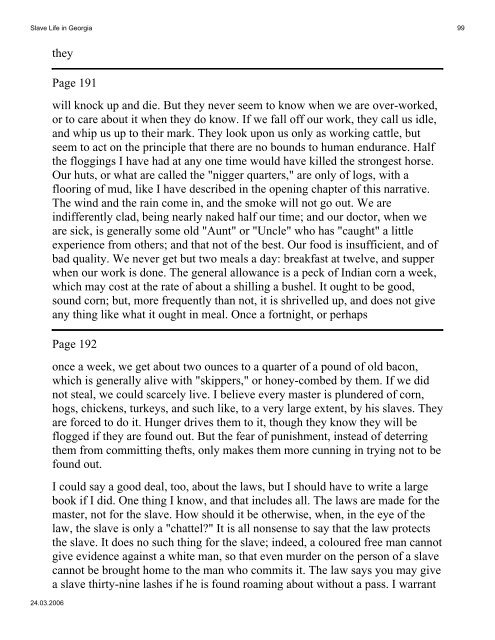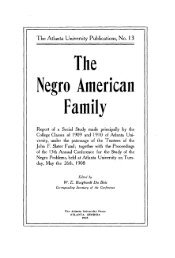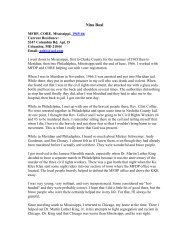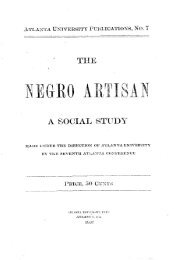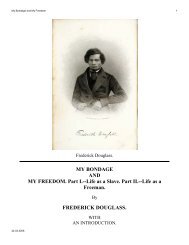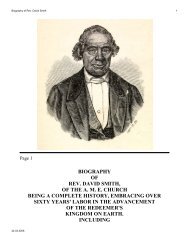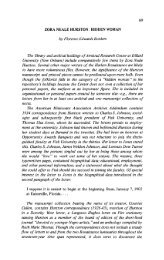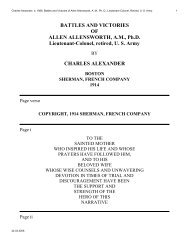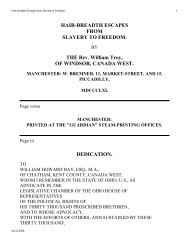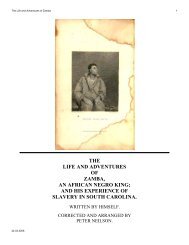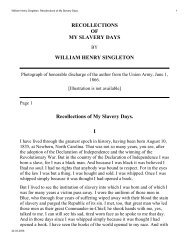Slave Life in Georgia - African American History
Slave Life in Georgia - African American History
Slave Life in Georgia - African American History
You also want an ePaper? Increase the reach of your titles
YUMPU automatically turns print PDFs into web optimized ePapers that Google loves.
<strong>Slave</strong> <strong>Life</strong> <strong>in</strong> <strong>Georgia</strong> 99<br />
they<br />
24.03.2006<br />
Page 191<br />
will knock up and die. But they never seem to know when we are over-worked,<br />
or to care about it when they do know. If we fall off our work, they call us idle,<br />
and whip us up to their mark. They look upon us only as work<strong>in</strong>g cattle, but<br />
seem to act on the pr<strong>in</strong>ciple that there are no bounds to human endurance. Half<br />
the flogg<strong>in</strong>gs I have had at any one time would have killed the strongest horse.<br />
Our huts, or what are called the "nigger quarters," are only of logs, with a<br />
floor<strong>in</strong>g of mud, like I have described <strong>in</strong> the open<strong>in</strong>g chapter of this narrative.<br />
The w<strong>in</strong>d and the ra<strong>in</strong> come <strong>in</strong>, and the smoke will not go out. We are<br />
<strong>in</strong>differently clad, be<strong>in</strong>g nearly naked half our time; and our doctor, when we<br />
are sick, is generally some old "Aunt" or "Uncle" who has "caught" a little<br />
experience from others; and that not of the best. Our food is <strong>in</strong>sufficient, and of<br />
bad quality. We never get but two meals a day: breakfast at twelve, and supper<br />
when our work is done. The general allowance is a peck of Indian corn a week,<br />
which may cost at the rate of about a shill<strong>in</strong>g a bushel. It ought to be good,<br />
sound corn; but, more frequently than not, it is shrivelled up, and does not give<br />
any th<strong>in</strong>g like what it ought <strong>in</strong> meal. Once a fortnight, or perhaps<br />
Page 192<br />
once a week, we get about two ounces to a quarter of a pound of old bacon,<br />
which is generally alive with "skippers," or honey-combed by them. If we did<br />
not steal, we could scarcely live. I believe every master is plundered of corn,<br />
hogs, chickens, turkeys, and such like, to a very large extent, by his slaves. They<br />
are forced to do it. Hunger drives them to it, though they know they will be<br />
flogged if they are found out. But the fear of punishment, <strong>in</strong>stead of deterr<strong>in</strong>g<br />
them from committ<strong>in</strong>g thefts, only makes them more cunn<strong>in</strong>g <strong>in</strong> try<strong>in</strong>g not to be<br />
found out.<br />
I could say a good deal, too, about the laws, but I should have to write a large<br />
book if I did. One th<strong>in</strong>g I know, and that <strong>in</strong>cludes all. The laws are made for the<br />
master, not for the slave. How should it be otherwise, when, <strong>in</strong> the eye of the<br />
law, the slave is only a "chattel?" It is all nonsense to say that the law protects<br />
the slave. It does no such th<strong>in</strong>g for the slave; <strong>in</strong>deed, a coloured free man cannot<br />
give evidence aga<strong>in</strong>st a white man, so that even murder on the person of a slave<br />
cannot be brought home to the man who commits it. The law says you may give<br />
a slave thirty-n<strong>in</strong>e lashes if he is found roam<strong>in</strong>g about without a pass. I warrant


